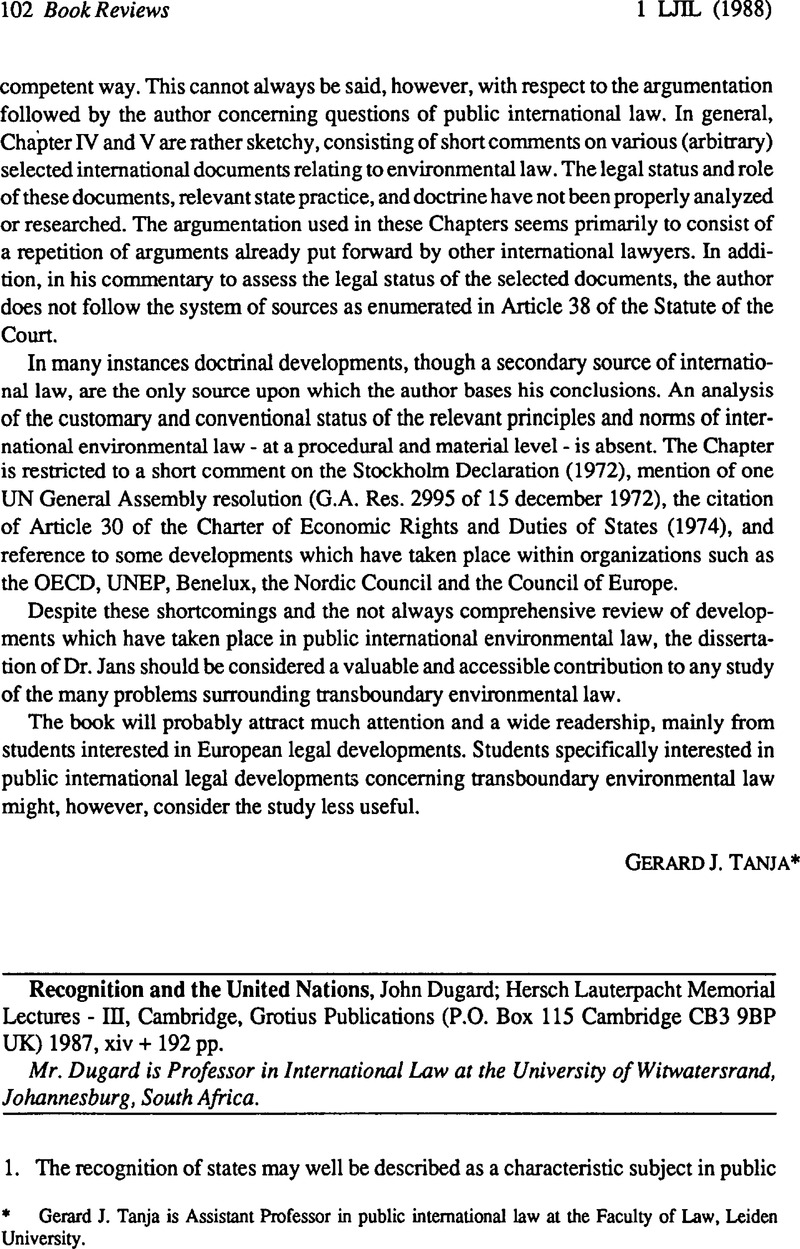Article contents
Recognition and the United Nations, John Dugard; Hersch Lauterpacht Memorial Lectures - III, Cambridge, Grotius Publications (P.O. Box 115 Cambridge CB3 9BP UK) 1987, xiv+192 pp.
Published online by Cambridge University Press: 21 July 2009
Abstract

- Type
- Book Reviews
- Information
- Copyright
- Copyright © Foundation of the Leiden Journal of International Law 1988
References
1. The recognition of states may well be described as a characteristic subject in public Statement delivered in the Dutch Second Chamber, see Handelingen II, at 686 (1968/9).
2. See, for instance, the Montevideo Convention on the Rights and Duties of States (1933), Art. 1,165 L.N.T.S. 19, and 28 AJ.IJL. supplement 75 (1934).
3. As to recognition in general, two monographs are considered as standard setting: Sir Lauterpacht, Recognition in International Law (1947); and Ti-Chang Chen, The International Law of Recognition, edited by L.C. Green (1951).
4. The vehement discussion in the Netherlands triggered by this event, is described by PJ. Kuyper, Recognition: Netherlands Theory and Practice, 1 International Law in the Netherlands 372–7 (1978), and in 6 Netherlands Yearbook of International Law 251–2 (1975). The Dutch government in first instance refused to recognize Guinea-Bissau. In her eyes, the country did not comply with the traditional criteria on statehood, as set forth in international law: the Portuguese were still in control of the larger part of the country. Apparently, the rules of international law played a more dominant role in the Dutch decisionmaking process than Mr. Luns had suggested five years earlier.
5. Even South Africa refrained from according express recognition to Rhodesia, although it maintained diplomatic relations (!) and close economic ties.Curiously, in the case of the Turkish Republic of Northern Cyprus the Security Council condemned “all secessionist actions, including the purported exchange of ambassadors between Turkey and the Turkish Cypriot leadership”, which it declared to be “illegal an invalid”! A better example of the UN interference with matters that used to fall within the exclusive competence of sovereign states, is not likely to be found.
6. Seen along these lines, non-recognition is one of the very few instruments available to the international community, in order to maintain the rule of law. Chen, however, is highly critical on the effect of it:
Non-recognition as a sanction exists only in legal concept. It does not alter a situation of fact, unless it is accompanied by the use of physical or moral force. It is an illusion that non-recognition can be a substitute for other, more vigorous measures in the upholding of law… but it is indispensable for the application of any other form of sanction…. The failure (in the application of the doctrine in the Manchukuo case and after -RL) is due not so much to the doctrine itself, as to the weakness of the law behind it.
Chen, supra, note 3, at 441–2.
7. Kuyper, , supra, note 4, at 376.Google Scholar
- 1
- Cited by




